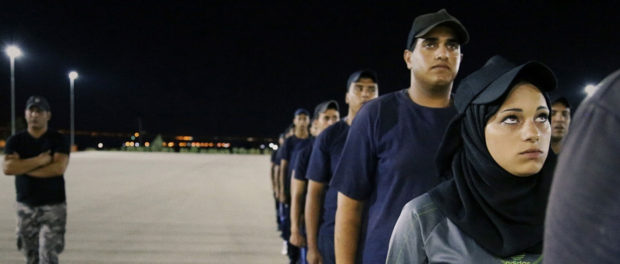Film Review: What Walaa Wants
Growing up in the Palestinian Balata Refugee Camp, 15 year old Walaa’s options seem limited. Her father lives in Jordan with a new family. Her mother just spent eight years in an Israeli prison for being part of a plan to assist a suicide bomber. Walaa’s not interested in school. She’s not interested in becoming a wife and mother.
What she wants, though, slowly takes shape as we follow her from the ages of 15 to 21. First, she wants to be arrested for throwing stones at Israelis like her cousin. Then she wants to have a gun. She wants to have a salary. She wants to have authority. She want to have self-determination without a husband to answer to. But ultimately, what she chooses is to join the Palestinian Security Forces and train to be a policewoman, a component of Palestinian government that takes on duties of policing and security in the Territories.
Strong-willed and outspoken, Walaa has a hard time in the military-style organization. Women are far less numerous than men, and Walaa is not a team player. The training is rigorous, enough so that the soldiers pass out in the heat or vomit from exhaustion. She is constantly in trouble for smirking, faking illness, wearing makeup, and just speaking her mind. Punishments include running and standing at attention. She gets the other women in trouble multiple times, and finds herself friendless and on the verge of expulsion.
Walaa’s journey into and through training is harrowing. At every step, she fights against forces that conspire against her, beginning with the circumstances in which she is born. Beyond that, though, Walaa faces disapproval of her chosen path from her family, as well as her own headstrong personality. This makes for a compelling documentary from start to finish and one never knows right up until the very end of the film what will happen to Walaa.
Alongside Walaa’s story are glimpses into the lives of those close to her and more broadly the Palestinians. I suppose there is no way to avoid being political when filming the people of the Palestinian Territories, and Director Christy Garland presents a dire situation. Walaa and her family are strong Palestinian nationalists and make their anti-Israeli sentiments known. They laud a Palestinian man as a hero after he was left to bleed to death for killing a rabbi. Facebook pages teem with nationalistic messages. Yasser Arafat’s picture hangs overtly in many places like a religious icon. Balata Camp is an overcrowded slum, with trash and graffiti in its maze-like streets. Walaa is seen riding a horse on the outskirts, close to the barbed wire topped wall that separates the territory. When she plays, it’s in her house, kicking a soccer ball in the hallway with younger children. Options for life and work are limited.
Walaa’s mother, Latifa, a formidable looking woman who chain smokes and loves her children, is not at all repentant for her crime, presumably, conspiracy to commit an act of terrorism because she was supposed to provide transportation for a suicide bomber. The only thing any of the family seems to regret is that they weren’t together for eight years. Instead, Latifa emphasizes pride in fighting for Palestine and serving the nation. Both Walaa and her brother, Mohammed, are seeking ways to live up to their mother’s past without any kind of check on what they admire. At least Mohammed can find work in Israel and is exposed to things outside of Balata Camp. Walaa is restricted by the fact that as a woman, which carries with it the expectation is that she will be raising kids and caring for her husband. Her distance towards her future is that much greater.
There are many things to love in this film. Walaa is such a loose canon that things are not resolved all the way up until the end of the film. Perhaps if this film were taking place anywhere else, Walaa would be a good representative of the worldwide fight for equal rights for women or even the way poverty is a major international concern. But nationalism and a comfort with terrorism are extremely uncomfortable and even reprehensible traits. Walaa possesses both. Garland is generous to share this with us, as I think it complicates the film and muddies what would otherwise be a film about an underdog overcoming obstacles that include gender bias and social status. Instead, we meet someone who is both appealing and distasteful. At least by the end of the film, Walaa seems to have found a way to serve the Palestinians that is entirely of her own making and reflective of her struggles.
The RIDM (Montreal International Documentary Festival) continues until November 18. For tickets and showtimes click HERE.






